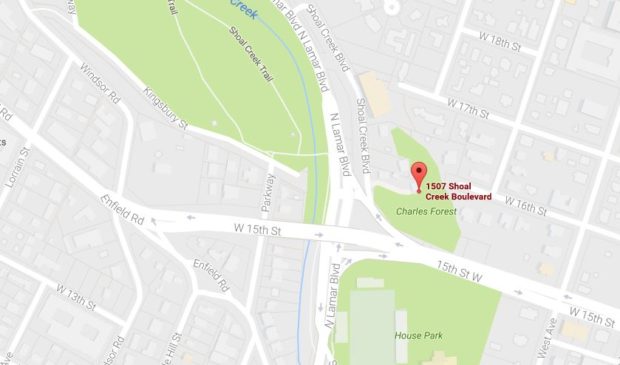Commission split on mixed-use zoning near Lamar
Thursday, August 25, 2016 by
Jack Craver The Planning Commission urged a property owner and his neighbors to try to reach a compromise Tuesday after a hearing in which both sides of a contentious zoning case accused the other of duplicity.
“They’re traumatized; I’m traumatized,” said John Scott Neal, the owner of a parcel of land that includes 1507, 1509, 1511, 1601 and 1603 Shoal Creek Blvd., describing the months-long squabble with neighbors over his proposal to rezone the property.
Neal wants to take part in the city’s vertical mixed-use density bonus program, with the hope of providing a mix of office space and housing, some of which would be designated for residents at 80 percent of the area median family income.
Currently, the two tracts that make up the property are zoned for office use, but they include 16 apartment units that existed before the current zoning was put in place. Calling the current setup “unsustainable,” Neal, whose father passed the property onto him when he died 14 years ago, said he wanted to redevelop the land so that it could remain profitable and stay in the family. But to build any new residences, he needed a zoning change.
He had been negotiating in good faith with neighbors over the issue since the beginning of the year, he said, but they clearly were not interested in compromising. Every time they got close to a deal, they would back out and make new demands, he said.
“For my mental sanity and my family’s financial future, I must move on,” he said.
Neal’s neighbors from the upscale Judges Hill Neighborhood had a different account of how things went down, however. According to Paul Gosselink, who lives right behind the tract on West 16th Street, Neal refused to disclose any specifics about his plan for the property. Neal did concede upon questioning that he did not know how many apartment units, including affordable units, would ultimately be built.
Furthermore, alleged Gosselink, although Neal said he was willing to submit to a restrictive covenant to prohibit certain uses on the property, the contracts he proposed included language that essentially made them worthless. Two real estate attorneys told them “absolutely not to sign it because they would be unenforceable by us,” he said.
The neighbors want a number of promises from Neal aimed at reducing noise from the property, including a prohibition on roof decks, limits on the size of balconies and to a commitment to maintaining the existing setbacks on the side and front of the property. They also don’t want to see the commercial space used for a restaurant or medical office, among other things.
Neighbors were particularly concerned that the upcoming implementation of CodeNEXT, an overhaul of the city’s land development code that is currently underway, might invalidate whatever agreement they came to with Neal.
As has often been the case in contentious debates over changes to land-use regulations, a number of commissioners suggested that it might be better to allow CodeNEXT to determine the fate of the property’s zoning.
Commission Chair Stephen Oliver said he was conflicted about the proposal, adding that the applicant could add significantly more office space under the current zoning if his goal were to increase profitability.
Commissioner Patricia Seeger said the area was perfect for a dense, mixed-use development, citing its proximity to Lamar Boulevard. Although the property is not on Lamar, it is so close that city staff considered it essentially to be on a “core transit corridor.”
“If we are to get to that compact, dense situation, we have to start making some very hard decisions,” she said.
Commissioner Karen McGraw was adamantly opposed, saying the project “has no vision” and that vertical-mixed use is inappropriate in between single-family homes and the nearby Pease Park.
“I’m always kind of nervous about that zoning; it’s so open-ended,” she said.
Commissioner Nuria Zaragoza said that she thought the site was not very pedestrian-friendly and that she sympathized with the neighbors’ concerns about noise and their desire for a more “passive” use.
Commissioner James Schissler issued a stinging rebuke to commissioners opposing the request, saying that it was “hypocritical” for the city to talk about encouraging affordability while denying such projects. Commissioner Chito Vela also expressed puzzlement at the criticisms, citing the nearby amenities – including the park and the Shoal Creek Trail – as reasons to encourage residential use.
“I would hate to just see an office tower there,” he said.
A motion to reject the request was supported by McGraw, Zaragoza and commissioners James Shieh, Trinity White and Tom Nuckols; it was opposed by Schissler, Vela, Seeger and Commissioner Jeffrey Thompson. With Oliver and Commissioner Angela Pineyro De Hoyos abstaining, the motion fell short of the seven-vote majority necessary.
Finally, the commission resolved to postpone the case until Oct. 11, urging the two sides to further negotiate.
This story has been corrected to reflect the correct date of postponement, which is in October, not September.
The Austin Monitor’s work is made possible by donations from the community. Though our reporting covers donors from time to time, we are careful to keep business and editorial efforts separate while maintaining transparency. A complete list of donors is available here, and our code of ethics is explained here.
You're a community leader
And we’re honored you look to us for serious, in-depth news. You know a strong community needs local and dedicated watchdog reporting. We’re here for you and that won’t change. Now will you take the powerful next step and support our nonprofit news organization?






